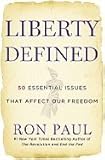Estimated reading time: 4 minute(s)
 I have been enjoying Ron Paul’s book, Liberty Defined. Enjoying, and finding myself becoming frustrated by it.
I have been enjoying Ron Paul’s book, Liberty Defined. Enjoying, and finding myself becoming frustrated by it.
See, there’s no doubt in my mind that I am mostly a libertarian. Mostly. I’m not completely one because I understand that people—you, and me—are sinful. We have a natural bent towards doing the wrong thing. (Or, not doing the right thing.) The Bible tells us so, and, well, so do our eyes and our reasoning. So a completely free society, with little to no rules/laws to govern our actions towards others… well, it just can’t work.
And the whole book that thought keeps returning. I keep thinking, You know, he’s so right on! We should have the freedom to choose what we want to do, not be made to conform to some behavior through some law or system of laws and regulations… But quickly on the heels of that thought are the reminders that the hearts of men are selfish and self-serving and devious. (I believe the word is “sinful”.)
George Washington mentioned the importance of morality and religion to society. (Basically, they can’t exist without those foundations.) Many others from the Generation of 1776 expressed similar sentiments. They knew that you can’t divorce liberty from responsibility, and they knew that our natural condition was fallen, sinful. (All of the restrictions built into our system of government are for precisely this reason!)
Does that mean Ron Paul is wrong? No, I still think he’s right, but since we can’t do away with sin, it’s mostly just a utopian view of life together as a nation, that can’t ever be fully realized.
I believe Mr. Paul realizes this, too, and he’s not truly advocating a completely lawless society. (I know he’s not wanting anarchy.)
And he does make some good points.
I recently read his thoughts on Marriage. (Each chapter of the book is essentially a short essay on issues that affect our freedom, and one of them tackled marriage.) I can’t quote the whole chapter, but I do wish you could/would read the whole chapter. (Just click the book cover at the top of this post to purchase a copy of the book, or check it out from your local library!)
This paragraph stuck out to me:
The supercharged emotions are on both extremes of the issue, because neither extreme accepts the principles of a free society. One side is all too willing to use the law to force a narrow definition of marriage on everyone without a hint of tolerance. The other side—a minority opinion—wants the law to help them gain social acceptance even though this is impossible for law to achieve. Those who seek social acceptance of gay marriage are also motivated by the desire to force government and private entities to provide spousal benefits. When dealing with government benefits, this becomes an economic redistribution issue—a problem that would not be found in a truly free society.1
“Neither extreme accepts the principles of a free society.” Wow is that true. We just can’t leave each other alone. We all have our various agendas, and we fight hard to make sure that the state—the law—makes everyone else think and act like we do. I said in yesterday’s post that this definitely won’t work.
So in a free society, each person should be allowed do as their conscience allows or instructs them to, unless it is somehow (actually) injurious to another. Instead, we must fight to be right, or to be accepted.
Paul concludes:
This issue hardly justifies an amendment to the Constitution; passage or even a heated debate only serves to divide us and achieves nothing. It is typical of how government intervention in social issues serves no useful purpose. With a bit more tolerance and a lot less government involvement in our lives, this needless problem and emotionally charged debate could be easily avoided.
His recommendation is to make marriage a private matter. “Though there may be a traditional dictionary definition of marriage, the First Amendment should include allowing people to use whatever definition they’d like.”
I concur. And I concur with much that Ron Paul has to say. (Remember? I am conditionally libertarian.)
If you are looking for a good, thought-provoking, conversation-starting read, I recommend, “Liberty Defined”.
And, in the end, I will continue to agree with people like Ron Paul, who believe in allowing for the maximum amount of freedom possible in a society. Just remember that there must be limits—a conditional libertarianism, thanks to the “condition” of sin.
(Good thing Jesus took care of that in the long run!)
1 – Liberty Defined, Ron Paul, ©2011 Grand Central Publishing, p. 184
